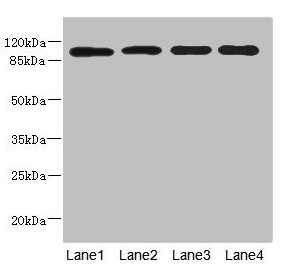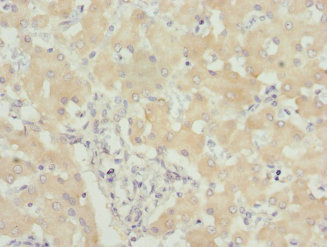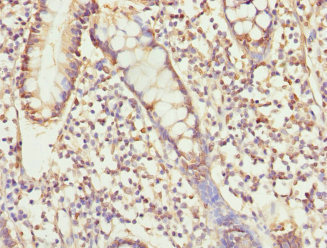Full Product Name
Rabbit anti-Homo sapiens (Human) USP26 Polyclonal antibody
Alternative Names
Deubiquitinating enzyme 26 antibody; MGC120066 antibody; MGC120067 antibody; MGC120068 antibody; Ubiquitin carboxyl terminal hydrolase 26 antibody; Ubiquitin carboxyl-terminal hydrolase 26 antibody; Ubiquitin specific peptidase 26 antibody; Ubiquitin specific processing protease 26 antibody; Ubiquitin specific protease 26 antibody; Ubiquitin thioesterase 26 antibody; Ubiquitin thiolesterase 26 antibody; Ubiquitin-specific-processing protease 26 antibody; UBP26_HUMAN antibody; USP 26 antibody; USP26 antibody
Species Reactivity
Human, Mouse
Immunogen
Recombinant Human Ubiquitin carboxyl-terminal hydrolase 26 protein (664-913AA)
Immunogen Species
Homo sapiens (Human)
Purification Method
Antigen Affinity Purified
Concentration
It differs from different batches. Please contact us to confirm it.
Buffer
PBS with 0.02% sodium azide, 50% glycerol, pH7.3.
Tested Applications
ELISA, WB, IHC
Recommended Dilution
| Application |
Recommended Dilution |
| WB |
1:1000-1:5000 |
| IHC |
1:20-1:200 |
Storage
Upon receipt, store at -20°C or -80°C. Avoid repeated freeze.
Lead Time
Basically, we can dispatch the products out in 1-3 working days after receiving your orders. Delivery time maybe differs from different purchasing way or location, please kindly consult your local distributors for specific delivery time.
Description
The USP26 antibody is produced by immunizing rabbits with the recombinant human USP26 protein (664-913AA) and then antigen-affinity-purified from rabbit antiserum. It occurs as an unconjugated IgG. It shows reactivity with human and mouse USP26 protein, a deubiquitylating enzyme that plays a negatively regulatory function in cellular reprogramming and is required for embryonic stem cell (ESC) differentiation. This USP26 antibody has been validated for use in ELISA, WB, and IHC applications.
Usage
For Research Use Only. Not for use in diagnostic or therapeutic procedures.








